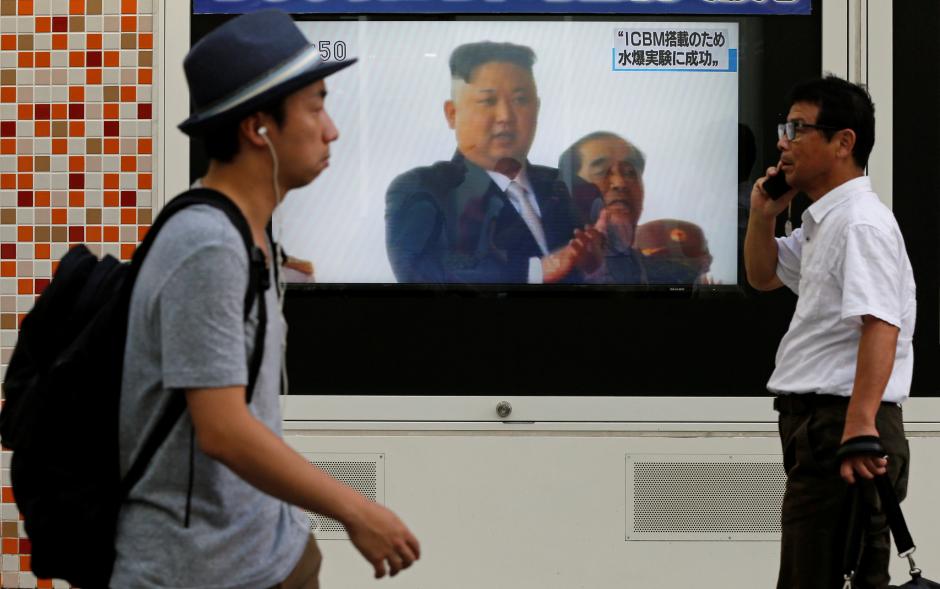World powers expressed on Sunday their concern over North Korea’s latest nuclear test, during it which it claimed to have successfully tested a hydrogen bomb.
The United Nations nuclear watchdog expressed grave concern and Russia said it could lead to serious consequences.
US President Donald Trump has reacted to what he’s calling “a major Nuclear Test” by North Korea — branding the North “a rogue nation” whose “words and actions continue to be very hostile and dangerous” to the United States.
Trump tweeted that North Korea “has become a great threat and embarrassment to China, which is trying to help but with little success.”
China is by far the North’s biggest trading partner.
The explosion of what North Korea said was an advanced hydrogen bomb caused residents across the border in China to flee their homes, fearing an earthquake. Japan and South Korea said it was around 10 times more powerful than the tremor picked up after the last test a year ago.
South Korea said it wants to answer North Korea’s sixth nuclear test with the strongest measures possible.
South Korea’s National Security Director Chung Eui-yong said that President Moon Jae-in will seek every available diplomatic measure, including new sanctions from the United Nations Security Council. He revealed Moon will also discuss with Washington ways to deploy the “strongest strategic assets” the US has to completely isolate Pyongyang.
French President Emmanuel Macron urged the UN Security Council to react quickly and decisively.
“The international community must treat this new provocation with the utmost firmness, in order to bring North Korea to come back unconditionally to the path of dialogue and to proceed to the complete, verifiable and irreversible dismantling of its nuclear and ballistic program,” he said in a statement.
He also called for a “united and clear reaction of the European Union.”
China, the only North Korean ally that is a permanent member of the Security Council, condemned the test. The foreign ministry said in a statement that the Chinese government has “expressed firm opposition and strong condemnation” of Sunday’s detonation.
China urged North Korea to “stop taking erroneous actions that deteriorate the situation.” It said it would fully enforce UN resolutions on the country.
The Russian foreign ministry called for calm.
“In the emerging conditions it is absolutely essential to keep cool, refrain from any actions that could lead to a further escalation of tensions,” it said on its website, adding that North Korea risked “serious consequences”.
The ministry issued a statement urging immediate dialogue and negotiations, which are the only way settle the Korean Peninsula’s problems, “including the nuclear one.” Later on Sunday, Russian President Vladimir Putin is set to meet his Chinese counterpart Xi Jinping in China.
The ministry reaffirmed Russia’s readiness to participate in negotiations, “including in the context of the implementation of the Russian-Chinese road map.” Under that proposal, North Korea would suspend nuclear and missile tests in exchange for the US and South Korea suspending their joint military exercises.
Just hours before the nuclear test, Trump talked by phone with Japanese Prime Minister Shinzo Abe about the “escalating” nuclear crisis. After Pyongyang fired a ballistic missile over Japan last week, he tweeted that “talking is not the answer”.
The International Atomic Energy Agency, which has no access to North Korea, called the nuclear test, Pyongyang’s sixth since 2006, “an extremely regrettable act” that was “in complete disregard of the repeated demands of the international community.”
The organization in charge of the global nuclear test ban treaty – which cannot come into legal force until ratified by the United States, China, India, Iran, Israel, Pakistan and Egypt as well as North Korea – said things had to change.
“I sincerely hope that this will serve as the final wake-up call to the international community to outlaw all nuclear testing by bringing the CTBT into force,” said Lassina Zerbo, head of the Comprehensive Test Ban Treaty Organization.
